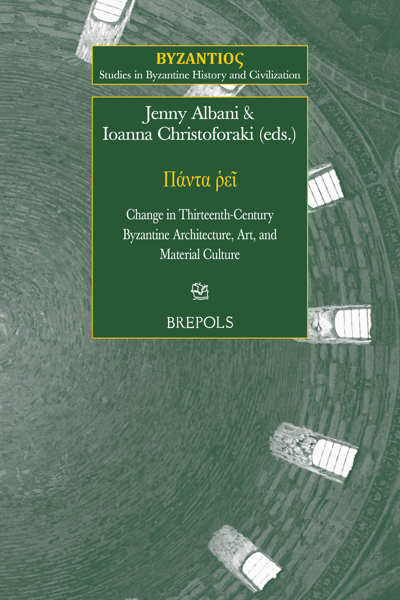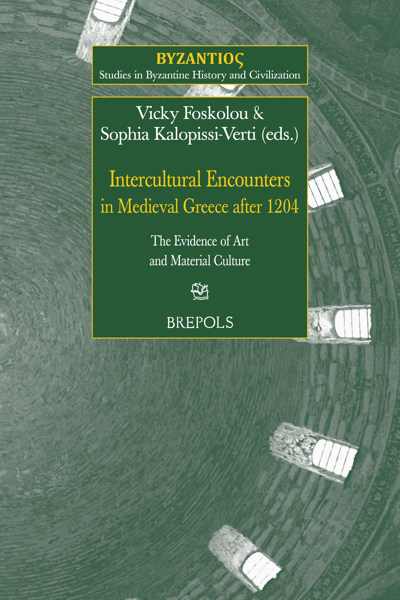
Byzantine Historiographical Prefaces (4th–15th Centuries)
A Study on the Praxis and Culture of Writing History in Byzantium
Eirene-Sophia Kiapidou
- Pages: 268 p.
- Size:156 x 234 mm
- Illustrations:6 tables b/w.
- Language(s):English, Greek
- Publication Year:2025
- € 75,00 EXCL. VAT RETAIL PRICE
- ISBN: 978-2-503-61251-5
- Paperback
- Available
- € 75,00 EXCL. VAT RETAIL PRICE
- ISBN: 978-2-503-61252-2
- E-book
- Available
A study of the specific features of the genre of Byzantine historiographical proems as well as their theoretical remarks about history-writing in Byzantium
"In terms of its main focus, the prefaces of extant histories between the fourth and fifteenth centuries, this book offers a valuable survey of this varied material, with the salient points of each preface highlighted and intertextual connections noted." (Michael Whitby, in Plekos, 27, 2025, p. 590)
"Eirene-Sophia Kiapidou’s monograph is an ambitious study of a long-neglected textual genre: the historiographical proem. Drawing upon Gerard Genette’s theory of paratexts, it treats proems not merely as ancillary introductions, but as independent microtexts with their own generic identity. By combining classification, typology, and thematic analysis, the book provides a panoramic overview of this material, tracing its origins in ancient Greek and Latin literature and mapping its evolution through the Byzantine period." (Ioannis Polemis, in The Byzantine Review, 7, 2025, p. 407)
Eirene-Sophia Kiapidou is an Associate Professor of Byzantine Philology at the University of Patras (Greece). Her research interests include Byzantine historiography, epistolography and critical editions of Byzantine texts. She is the author of two more books in Greek: Ioannes Skylitzes’ Synopsis of Histories and its Sources (811-1057). Contribution to the Byzantine Historiography of the Eleventh Century (Athens, 2010), and Theophylaktos of Ohrid, Martyrdom of the Fifteen Martyrs of Tiberiopolis (Athens, 2015; critical edition of the text with translation and commentary).
In recent years a lively debate has developed on the features of Byzantine historiography. The increasingly dominant tendency today is to treat historical texts more as pleasant literary narratives than as systematic historical accounts of the political and military history of Byzantium. The present study aims to contribute to this debate by revisiting the voices of the Byzantine authors themselves, focusing on the extant historical prefaces from the Early, Middle, and Late Byzantine eras. This seemed timely, more than a century after the publication of Ηeinrich Lieberich’s fundamental work on Byzantine historiographical proems.
Obviously, not all prefaces are of equal interest: some serve a purely conventional function, while others are composed more thoughtfully and merit more careful attention. The book’s goal is twofold: firstly, to outline the details of the prefatory function of the Byzantine historiographical proems as microtexts; secondly, to detect and evaluate the theoretical views expressed by the authors of each period regarding the genre of Byzantine historiography. This will expand our knowledge of how the Byzantines wrote (praxis) and thought (culture) about historiography.
Preface
Chronological list of proems of Byzantine Historiography discussed in this book with the location of their main presentation
Introduction
1. Current research in Byzantine historiography: a few necessary observations
2. The Byzantines and historiography
3. The proems of Byzantine historiography in modern bibliography
4. Significance and function of a proem
5. Why and How to treat proems of Byzantine historiography separately
6. The proems of classical Greek, Hellenistic, and Roman historical works: an introduction to the narrative patterns and ideas available to Byzantine authors
Chapter 1: The prefatory communication situation in Byzantine historiography
1a. Length: from zero to over hundreds words
1b. Location: preludial and sometimes internal
1c. Time of composition
1d. Person(s) addressed: educated friends and scholars, the emperor himself
1e. Authorship: the writer himself
1f. Form: title and boundaries
1g. Special generic features: metrical, epistolary and rhetorical proems
1h. Writing methods: originality and mimesis
Chapter 2: The content of the preserved proems of Byzantine historiography: eloquence in the service of the author’s specific expectations
2a. A few introductory remarks
2b. The elaborated proems of Byzantine historiography: a detailed overview
3c. The conventionally functional proems of Byzantine historiography: an overview
Chapter 3: Theoretical aspects of Byzantine historiography: the evidence of the proems
3a. The profile of the author
3b. The essence / value of history writing
3c. The practices of history–writing
3d. The profile of the reader/listener
3e. Conclusion: Final remarks and answers to current research questions
Bibliography
Index




